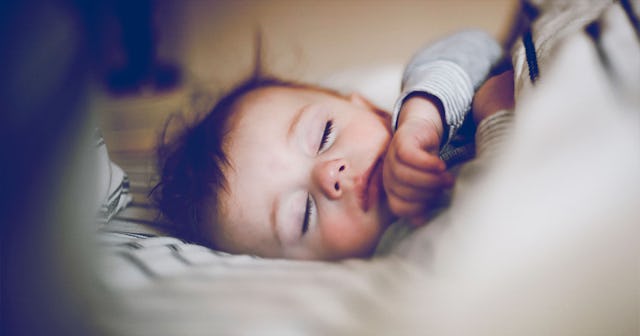The Critics Of Co-Sleeping Need To Stop Their Shame Crusade

When you herald the birth of your child, you think you’re inviting the world to join in your elation and joy. But, too often, what you’re effectively doing is announcing that it’s open season, you’re fresh meat. “Welcome harpies!” you might as well screech. “Start picking at me and my parenting whenever you’re ready!”
You get to hear that the names you’ve chosen are wrong (“Who in the world would name their son George?!”), your crib is wrong, the school district you live in is wrong. You should bottle feed and you shouldn’t; you should swaddle your baby, but swaddling your baby is a bad idea; pacifiers are really the problem, and thumb-sucking is taboo.
One day, a woman came up to me at the grocery store and physically removed my child’s thumb from his mouth, baby-talking at him about how “dittle baby boys douldn’t put dumbs in dur dittle mouths.” And I was too focused on her grimy talons to do anything but stand frozen. That was the final straw, and the next time my response wasn’t necessarily going to be freeze or flight.
I suppose it’s best to avoid conflict, especially with a baby björned to your frontside, so I started to keep as many of my parenting choices under wraps as best I could. I may not have been able to consistently avoid obtrusive know-it-alls in the checkout lane, but I was going to insulate myself from know-it-alls in my acquaintance circle.
And that right there is why I never told anyone that I was sharing a bed, nightly, with my infant son. Like many other parents we hadn’t planned to. Our reason? That doesn’t matter. (We “rule-breakers” are often called upon to explain ourselves, but why should we?)
With our silence, we averted any “instructive discussion.” Other parents, who aren’t so covert, leave themselves open to some hardcore pushback from the opposition.
JGI/Jamie Grill/Getty
Statistics and data are spat out, despite how misleading the numbers might be. Anecdotal horror stories are referenced, though responsible co-sleepers are aware of safety guidelines (including, but definitely not limited to, never sharing a couch and never, ever co-sleeping while intoxicated). No matter that babies, more than almost anything, need skin-to-skin contact with their parents’ bodies; no matter that “Homo sapien moms and their newborns have been sleeping together for more than 200,000 years.” The pro-bed-sharing argument, though solid, is summarily dismissed.
Notably, I’ve never heard of any (overt or covert) co-sleeper rail against a mother for not choosing to sleep beside their infant. They seem to understand, instinctively, that sleeping arrangements do not demand a one-size-fits-all approach. But the other faction? They are very busy embroidering scarlet letters, “outing” and shaming the co-sleepers.
This bullying seems particularly cruel at a time when hormones are causing chaos in new mothers’ bodies and minds. According to Postpartumdepression.org, roughly 1 in 7 mothers in the U.S. suffer depression within the first year after giving birth, which translates to approximately 600,000 diagnoses. And, since those figures only represent the mothers who sought treatment, the actual number may be at least twice that. The World Health Organization asserts that a “woman has a greatly increased risk of being admitted to a psychiatric hospital within the first month postpartum than at any other time in her life.”
Now consider this: the direct causes of general postpartum depression are not fully understood, though many factors are thought to play a role. That is just a fact. But it is also a fact that the shaming of co-sleeping mothers often affects their mental well-being. This added mental strain would be 100% avoidable—if spectators would stop policing the mothering practices of everyone else.
Citing a 2018 study, Emily Glover, writing for Motherly.com, explains: “[Moms] who opted to co-sleep for a longer period of time had higher rates of depression—not so much because of the sleeping arrangement itself, but because they felt judged by other parents.”
It makes you wonder. If the shamers knew the toll of their words, raised eyebrows, and “harrumphs,” would they back off? Maybe not. But what if they understood that the fallout from a mother’s mental illness could injure the child in the long term?
Research has identified an undeniable connection between postpartum depression and child development. The effects are numerous and far-reaching, ranging from “delayed cognitive and language development, disorganized or insecure attachment, higher rates of behavioral problems, and lower grades.” Plus, there is a well-documented link between postpartum depression and future mental illness in children.
And so, the critics of co-sleeping, whose arguments often hinge on protecting the child, could inadvertently be harming children with their shame crusade. That is a distressing irony.
They say it takes a village to raise a child. What it really takes: a village that understands that what is right for one family doesn’t always mean what is right for another. And, if that village can’t? They need to, at the very least, just shut their mouth.
This article was originally published on